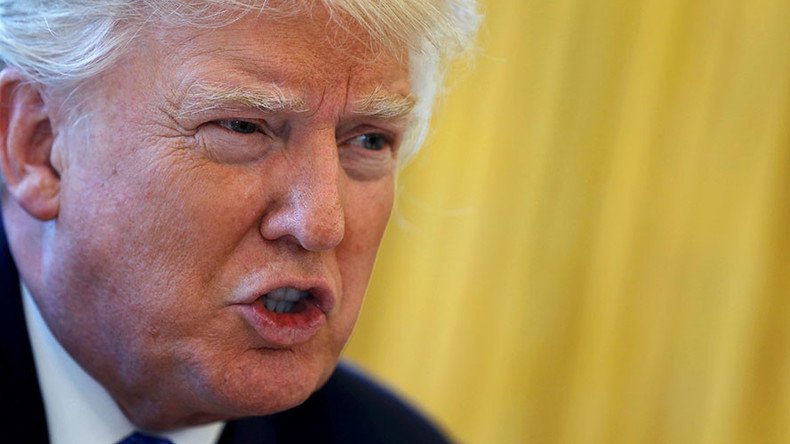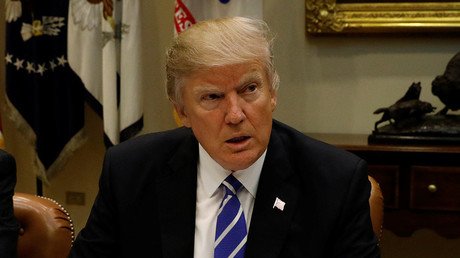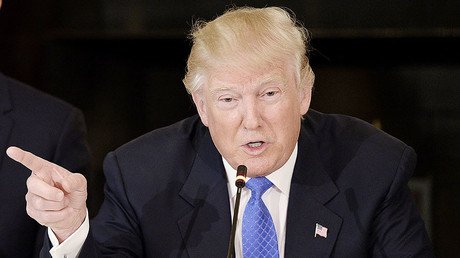Trump asks Congress to probe ‘pervasive leaks’ of classified info

President Donald Trump has asked Congress to investigate the leaks of classified government information, the White House said. He has also asked them to probe whether the Obama administration ordered the wiretapping of his campaign.
Trump is specifically asking lawmakers on the House and Senate intelligence committees to look into “pervasive leaks of national security classified information,” White House press secretary Sean Spicer said during an off-camera press gaggle on Monday. “He believes it undermines our national security.”
On Tuesday, Spicer expanded on why Trump had asked Congress to look into the leaks.
“I think the president believes that the appropriate place for this to be adjudicated is for the House and Senate intelligence committees ‒ who have the clearances, the staff, the processes ‒ to go through this, look at it, and report back,” Spicer said.
Q: Will POTUS stop tweeting accusations that Obama wiretapped & leaked if he won't take questions?
— RT America (@RT_America) March 7, 2017
A: I'll ask that & get back to you pic.twitter.com/dF3CT9YdSB
The request to Congress is only the latest attempt by the Trump administration to stem the tide of leaks coming out of the executive branch. Towards the end of February, Spicer ordered White House communications staffers to hand over personal and work cell phones for a “check,” and admonished them not to use encryption apps. The meeting was promptly leaked to the press. Around the same time, an internal State Department memo explaining the rationale for clamping down on government agency leaks was also leaked.
Trump previously blamed the leaks coming out of his administration, as well as protests against his presidency, on President Barack Obama.
Former CIA Director John Brennan has said that the source of the leaks is not as important as what is being leaked, and that “it’s premature to point fingers.”
The investigation into the leaks is not the only subject that Trump wants Congress to look into. On Sunday, Trump demanded a probe into unsubstantiated allegations he made the previous day that Obama ordered a wiretap on Trump Tower during the presidential campaign.
On Monday afternoon, Spicer would not say what, if any, evidence Trump had seen that substantiated his claims of wiretapping, but said that “there’s no question that something happened.”
“There’s been enough reporting that strongly suggests that something occurred,” Spicer said, but did not provide any specifics, The Hill reported.
White House adviser Kellyanne Conway defended the lack of evidence during an appearance on “Fox & Friends” on Monday morning.
“He is the president of the United States. He has information and intelligence that the rest of us do not [have],” she said. “That’s the way it should be for presidents.”
When asked Tuesday if he had seen the proof Trump had tweeted about, Spicer said he was “not in a position that that would be regularly part of my daily duties. For the president to sit down and go through that [evidence], that’s probably a level above my paygrade.”
An Obama spokesman denied the wiretap claims as “simply false.” A former deputy national security adviser for the Obama administration, Ben Rhodes, also denied the allegations, tweeting that “no president can order a wiretap.”
House Intelligence Chair Devin Nunes (R-California) has said that he would be open to investigating Trump’s accusations. Nunes played a role on the Trump transition team. On Wednesday, his committee approved the scope of its investigation into "links between Russia and individuals associated with political campaigns or any other U.S. Persons."
House Oversight Chair Jason Chaffetz (R-Utah), whose committee would play a supporting role in any probe, said he hasn’t seen any evidence to support Trump’s accusations of wiretapping, but he wouldn’t dismiss such a claim out of hand.
“Look, it's a very serious allegation,” Chaffetz said on “CBS This Morning” on Sunday. “The president has at his fingertips tens of billions of dollars in intelligence apparatus. I've got to believe – I think he might have something there, but if not, we're going to find out.”
The Senate Intelligence Committee “will follow the evidence where it leads, and we will continue to be guided by the intelligence and facts as we compile our findings,” Chairman Richard Burr (R-North Carolina) said in a statement.
The Department of Justice could also look into the wiretap accusations, although FBI Director James Comey pushed the DOJ to publicly refute the president’s claim. If Trump’s accusations turn out to be true, it could mean that both the Obama administration and the FBI acted unlawfully. However, if there were any wiretaps and they were legally acquired, it likely means that there was sufficient evidence to support a judge granting a warrant in the first place.
“I’m very worried that our president is suggesting that the former president has done something illegally,” Senator Lindsey Graham (R-South Carolina) said at a town hall over the weekend, according to the New York Times. “I would be very worried if, in fact, the Obama administration was able to obtain a warrant lawfully about Trump campaign activity with a foreign government.”
House Republicans have already asked the DOJ to launch a formal investigation into the possible leak of classified information following the resignation of former National Security Adviser Michael Flynn. Attorney General Jeff Sessions has recused himself from any investigation regarding reported interactions between the Trump campaign and Russia amid contradictions in Sessions’ sworn testimony during his Senate confirmation hearings over his meetings with Russian Ambassador to the US Sergey Kislyak.
Trump’s unilateral requests for investigations could backfire on him by hurting the president’s support among his own party, according to Simon Jackman, former professor of political science at Stanford University and now chief executive of the US Studies Centre at the University of Sydney.
“The risk is that it will eat into his political capital with the Republican base and it gives Republican members of Congress a reason to go even slower than they are in implementing his agenda,” Jackman told the Australian. “It was surprising that Trump gave the issue a huge jolt of oxygen with those tweets because now the Congress has no option but to hold hearings and pursue the matter.”
Any investigation into the Trump administration’s alleged ties to Russia needs to be bipartisan, Brennan said.
“If it’s only one party that’s going to be leading this, it is not going to deliver the results that the people need and deserve,” he said, adding that he hopes the committees investigate “with vigor, and with the appropriate amount of bipartisan support that it needs.”














